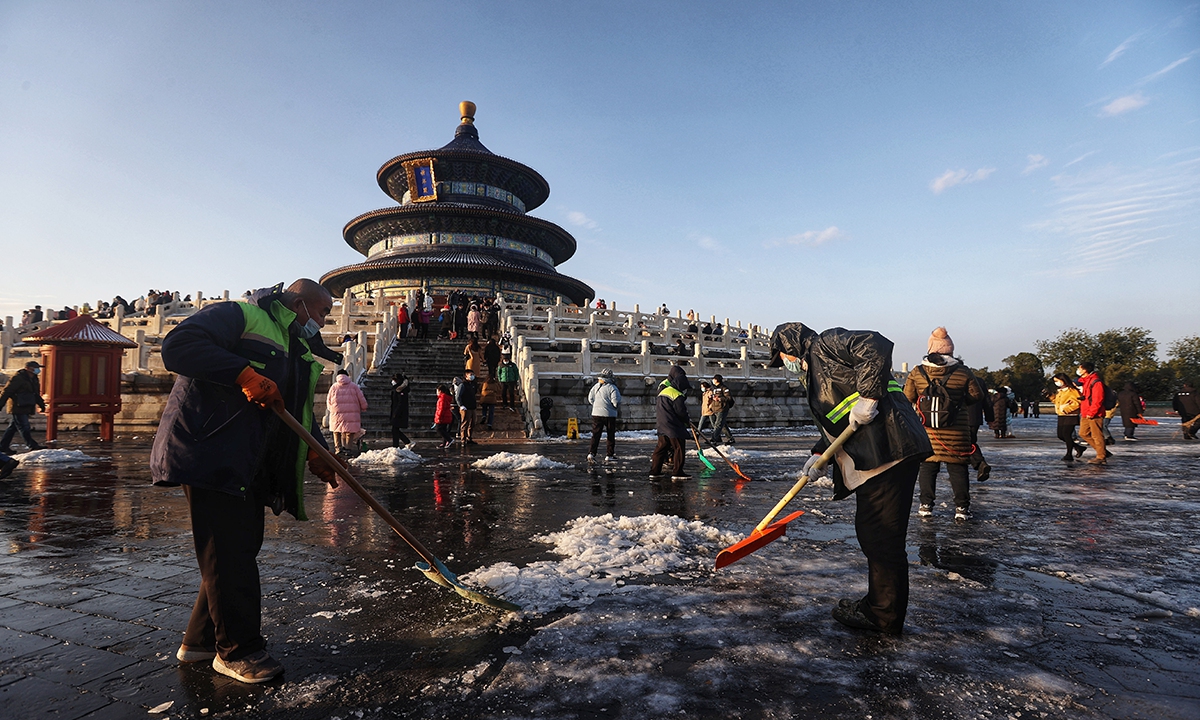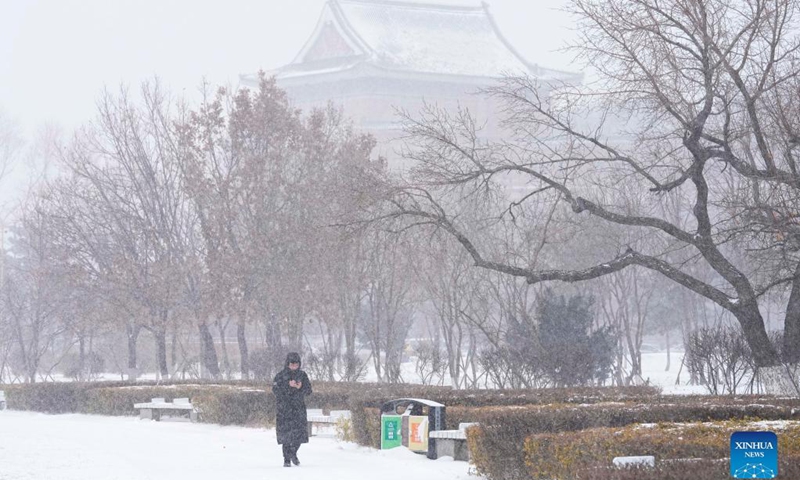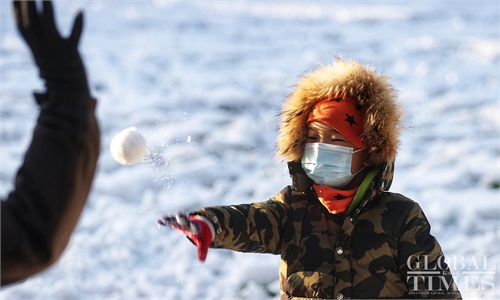
Workers clear away snow and ice at the Hall of Prayer for Good Harvests at the Temple of Heaven in Beijing on November 7. Beijing's first snow this year came 23 days earlier than average, and the temperature in the capital may hit a 10-year record low. Photo: Cui Meng/GT
The cold wave also brought blizzard conditions to many parts of the north, along with rain, sleet and snow, posing serious challenges in a wide range of areas, including transport, infrastructure, agriculture as well as energy supplies at a time when many parts of the country have already been grappling with tight energy supplies and even power shortages in recent months.
However, despite the severity of cold snap, the country has responded to the harsh weather conditions effectively, with swift early warning systems and adequate preparedness, which has ensured that life in affected areas is largely undisrupted and business activities continued. Moreover, the country has mobilized a whole-of-society response, including various government departments, companies and residential communities, to minimize impact on energy supply, epidemic prevention and control, infrastructure and agriculture.
Temperatures in the north and northeast nosedived, pushing temperatures down by as much as 16 C. Meteorologists forecast frequent cold waves this winter, although there will not be a repeat of the 2008 winter storm that ravaged southern parts of China.
Beijing's first snow came 23 days earlier than the winter average, and the temperature in the capital may hit a 10-year record low. It has already caused the suspension of some buses and cancelation of some flights and trains.
Large parts of the country, including Tianjin and Hebei Province experienced the winter's first significant snowfall and rain on Saturday, the China Meteorological Administration (CMA) said in a notice on Sunday.
Roads in some places in the capital city Beijing were covered with more than 15 millimeters of precipitation.
The words "cold wave," "snow," "how to keep warm" dominated Chinese social media on Sunday. Authorities warned people to stay inside and reduce outdoor activities.
Local governments rolled out policies to make people's lives easier during the cold wave. Beijing shortened the departure interval for buses, so passengers did not have to wait in the piercing wind, and Cangzhou, Hebei, will suspend classes on Monday in kindergartens, primary and middle schools.
Meteorologists said the cold wave will continue south, and temperatures nationwide will remain low for the next 10 days.
The climate phenomenon known as La Niña brought the unusually early snow, said meteorologists. Zhao Huiqiang, an official from the CMA, said that under the influence of La Nina, China will suffer frequent cold waves this winter.
Many people fear a recurrence of the winter storm that affected southern China in 2008. Jia Xiaolong, another official at the CMA, said the 2008 storm was partly caused by abnormal atmospheric circulation, which caused long-lasting rain and snow in a region that does not usually experience severe winter weather.
"Judging from this year's forecast, the water vapor transportation condition this year is not as good as 2008, hence the possibility of long-lasting and large-scale precipitation is very slim," Jia said. However, Jia warned of the impact of frozen weather on power grids and traffic and advised operators to prepare for sustained peaks in power consumption.

A resident walks amid snow in Changchun, northeast China's Jilin Province, Nov. 7, 2021. The traditional solar term of Lidong, the beginning of winter, fell on Nov. 7 this year. Photo: Xinhua
Adequate preparations
The arrival of the widespread cold snap coincides with concern over the power supply, after recent power outages in some parts of China.
Lin Boqiang, director of the China Center for Energy Economics Research at Xiamen University told the Global Times on Sunday that so far, the cold wave and snowfall has not affected transportation, and any localized disruption will be restored quickly.
Employees from the State Grid Cooperation of China's Shanxi branch conducted wide examination of the power grid in the province before the cold wave swept in, to ensure the safety of high voltage transmission lines and prevent hazards like sudden outages.
Lin said the volume of power that is needed for households occupies a very small proportion of industrial energy resources.
China's National Development and Reform Commission told media last week that China's daily production of coal soared to 11.89 million tons as of Thursday, a new high, and that the country has achieved a "phased" victory over ensuring energy supply for this winter and next spring.
The State Grid Corporation of China said on Sunday that with the increasing supply of coal, the power supply within its operation is back to the "normal level," and claimed a phased victory over guaranteeing people's power usage.
Lin said the government always attaches great importance on assuring the livelihood of its people, thus a "warm winter" for all people in the country is "quite guaranteed."
Apart from power supply, many local governments have prepared for COVID-19 prevention, as more than 20 provinces and municipalities across China have reported local COVID-19 cases.
Employees from a residential community in Tianshui, Gansu Province, sent quarantined residents masks, gloves, food and medicine.
COVID-19-affected regions will operate special snow and ice shoveling standards - snow in epidemic-related enclosed and controlled areas will be stacked and dissipated on the spot in the enclosed area, and it is not allowed to be transported out of the area, according to the Beijing Municipal Commission of Urban Management.
Wang Guangfa, a Beijing-based expert specializing in epidemiology told the Global Time that the possibilities of snow causing outbreak is low as long as people maintain good hygiene habits, but Wang urged to strengthen testing of cold-chain related goods in border areas of epidemic-affected regions because the virus can survive longer in winter.
A step ahead
Taking advantage of the snowfall, Yanqing zone of Beijing 2022 Winter Olympic Games held a drill on transferring injured athletes using ambulances on Sunday morning, in preparation to deal with the emergency rescue of athletes in extreme weather during the Games. Ambulances will perform major tasks when helicopters cannot operate in extreme weather.
The Beijing branch of the State Grid Corporation of China also held a drill to deal with a power emergency in Beijing's Wukesong Sports Center last week, to better the capacity of dealing with power outage during the event.
Huang Shuo, who works at the cooperation's office responsible for the games told media that the power equipment is subject to problems during winter where there is extreme weather, thus the company has devised equipment adapted to extreme cold weather, which is different from the equipment used at the summer Olympic Games in terms of maintenance and operation.

